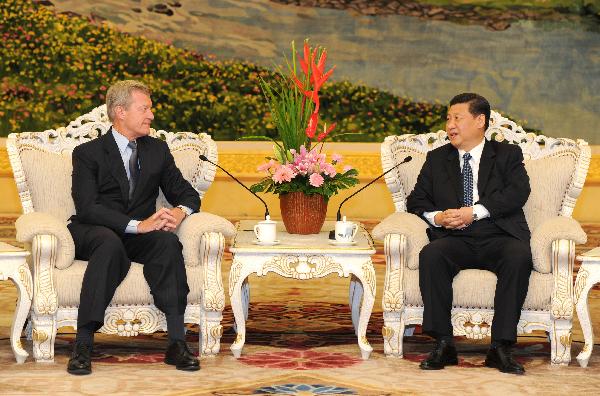
Sen. Max Baucus meets with current Chinese president Xi Jinping, then vice-president, in 2010 (Xinhua).
The Obama administration has announced that it will nominate outgoing Senator Max Baucus (D-Montana) to replace Gary Locke as the new U.S. ambassador to China. Baucus is seen as a strong U.S. hand in Beijing, The New York Times observes, owing to his efforts to reduce trade barriers between China and the United States, and to his insistence that “China play by internationally accepted rules” regarding currency manipulation and human rights. Baucus has visited China eight times, and personally met with current Chinese president Xi Jinping (then vice-president) in 2010.
While Baucus is not regarded as an East Asia or national security specialist, his more than three decades of service in the U.S. Senate have included extensive dealings with China. In 2011 as Senate Finance Committee chair, Baucus spoke out on behalf of Montanans and all Americans against China’s currency manipulation: “Montana businesses, ranchers and farmers are hurting because China has refused to play by the rules,” Baucus said, “China’s policy of deliberately depressing the value of its currency has put Montanans and all Americans at a disadvantage at a time when we are working harder than ever to move our economy forward.” In 2012, Baucus joined House Ways and Means Committee chair Dave Camp (R-Michigan) in calling on the Obama administration to push China to stop unfairly undervaluing its currency at World Trade Organization (WTO) talks. The same year he backed a U.S. complaint with the WTO against China’s rare earth mineral export restrictions.
As former chair and still a member of the Congressional-Executive Commission on China (CECC), Baucus has also taken strong stands for human rights in China. As CECC chair in 2002, he recommended that the United States advocate strongly for human rights in China, and called on President Bush during a visit to China that year to “urge Chinese authorities to perform a comprehensive review of those imprisoned for counterrevolutionary crimes, to release unconditionally all prisoners of conscience, to ratify the International Covenant on Civil and Political Rights, and to invite the U.N. Special Rapporteur on Religious Freedom to visit China.”
China views the Baucus nomination with some degree of trepidation, which is probably a good thing given China’s recent bad behavior on a host of issues. “He has a complicated attitude towards China,” Diao Daming, assistant researcher at the Institute of American Studies at the Chinese Academy of Social Sciences, said of Baucus to the Financial Times, “He was a very early supporter of granting China most favored nation trading status but he was also one of several senators who raised pressure on China over currency manipulation…. We need to be cautious and keep a watchful eye on him.”